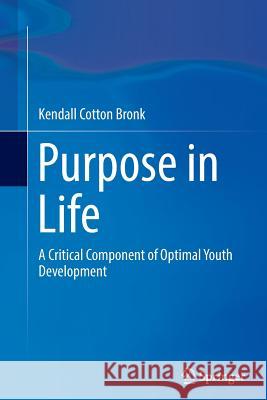Purpose in Life: A Critical Component of Optimal Youth Development » książka
Purpose in Life: A Critical Component of Optimal Youth Development
ISBN-13: 9789401778091 / Angielski / Miękka / 2016 / 175 str.
Recently psychologists have made a dramatic change in the way they approach the study of human development. Whereas researchers used to target ways of minimizing individuals' suffering and shortcomings, today we recognize this is insufficient and are increasingly focused on understanding and promoting optimal human development, or thriving. This new, more hopeful perspective on human capacity has been particularly influential with regards to the study of young people where, as leaders of the field note, being problem free is not the same as being fully prepared. Therefore research increasingly features youths' talents, assets, and pathways to flourishing. Key among the list of critical contributors to positive youth development is a purpose in life. Recently, research on the topic of youth purpose has exploded, and having personally been involved in conducting studies of purpose for the better part of the past decade, this book will synthesize, organize, and make sense of this rapidly growing body of research. The aim is to make sense of the disparate perspectives on the construct and to position purpose in the broader frame of positive psychology. Despite the obvious need, no such book exists. Purpose in Life: A Critical Component of Optimal Human Development will identify and integrate distinct strands of research on purpose. It will open with a comprehensive yet detailed discussion of the various definitions scholars have put forth that distinguish purpose from meaning, goals, ultimate concerns, and other related concepts. The book features a chapter that highlights research on the experience of leading a life of purpose. Compelling studies have explored both the daily and longer-term experience of a purposeful existence. Other chapters will delve deeply into measurement of the purpose construct and into research on the prevalence and forms of purpose among diverse groups of youth, including individuals from urban, suburban, and rural regions and individuals from different ethnic and socioeconomic backgrounds. Another chapter will focus on the developmental trajectory of purpose, as research finds the construct plays an especially important role in the transition to adulthood. Next the book will feature a chapter dedicated to a rigorous review of research on the central role purpose plays in supporting the healthy growth of young people. Following will be a section that identifies positive correlates of purpose and attempts to glean from existing research the mechanism through which purpose helps promote optimal development. In addition to addressing different types of purposes, including civic, religious, service-oriented, family, and professional purposes, this book will include a chapter that outlines the steps adults can take to foster purpose among young people. This chapter will cover research on a wide range of social and ecological supports for purpose. Finally, the book will conclude with a chapter that highlights weaknesses and identifies important gaps in the research on purpose. The book offers a state of the science on youth purpose, it clearly and succinctly synthesizes the sizable and rapidly growing body of research on youth purpose in a comprehensive yet easily accessible manner. This monograph will serve as an important research tool for quality of life scholars interested in conducting research on a wide range of positive psychology topics.











